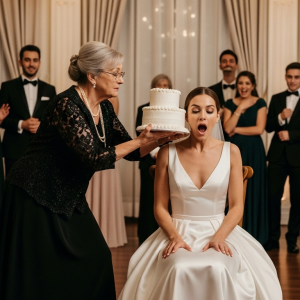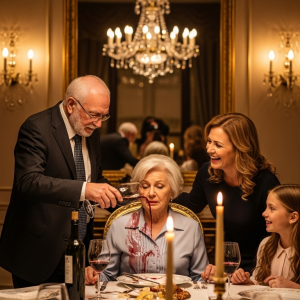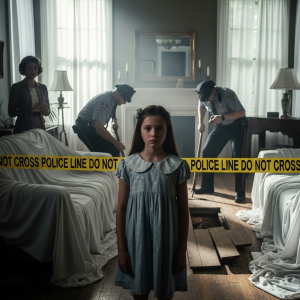The city had become a cage of noise and concrete, a relentless assault on our senses. For five years, my wife Sarah and I, along with our son Leo, had lived in a third-floor apartment where the sirens were our lullaby and the view was of someone else’s brick wall. I was chained to a desk in a glass tower, trading my hours for a paycheck, while Sarah’s vibrant spirit seemed to shrink a little more each day within those four walls.
Our dream was a simple one, born from late-night conversations over cheap wine: a place with a patch of green grass, where Leo could run without us fearing traffic, where the air didn’t taste of exhaust fumes. We yearned for a quiet life, a cliché we were desperate to make our reality.
After months of searching, we found it. A small, whitewashed farmhouse two hours north of the city, nestled in a valley of rolling hills. It was old, a little worn at the edges, but it had a wide front porch, a sprawling yard shaded by an ancient oak tree, and the kind of profound silence that felt like a blessing. It was our Eden, the place where we would heal, where we would finally start living instead of just surviving.
The day we got the keys, the previous owner, a weathered old man named Mr. Abernathy, met us at the property. He had kind, weary eyes, the color of a faded sky, and he moved with the slow, deliberate pace of someone deeply connected to the land.
He walked us through the house, pointing out its quirks, but his final piece of advice was delivered in the yard, his gaze fixed on a structure near the back of the property. It was an old stone well, capped with weathered, graying wooden planks and entwined with overgrown ivy.
“A word of warning about that,” he said, his voice a low, gravelly murmur. “That well’s been dry for the better part of a century. Stone-lined, goes down deep. My grandfather used to say it had a cold heart. If I were you, I’d have it filled in with earth. Plant a tree over it. Give the land back its peace.”
I chuckled, ever the pragmatist. “Don’t worry, we’ll be careful. We’ll make sure Leo knows to stay away from it.”
Mr. Abernathy didn’t smile. He just held my gaze for a moment longer. “It’s not about being careful, son. Some places just have a memory. And that one’s best left forgotten.” I dismissed it as the folksy rambling of an old man, but I noticed Sarah shiver slightly, pulling her cardigan tighter around her shoulders despite the warm afternoon sun.
The first two weeks were idyllic, a blur of blissful activity that affirmed every hope we’d had. We unpacked our city life from cardboard boxes and watched it transform into a country existence. I spent my days with dirt under my fingernails, fixing a loose shutter or mending a stretch of fence, feeling more accomplished than I ever had closing a deal in a boardroom.
Sarah seemed to come alive. She started a small vegetable garden, her hands covered in rich soil, her face lit with a genuine, unburdened joy I hadn’t seen in years. She hummed as she worked, a melody of contentment that drifted through the open windows of our new home.
And Leo, our five-year-old whirlwind of energy, was in heaven. He treated the vast yard as his personal kingdom. He chased butterflies through fields of wildflowers, built forts in the low branches of the oak tree, and collected fascinating pebbles and sticks, presenting them to us like precious treasures. We kept a close eye on him, of course, but for the first time, we felt we could relax our grip, letting him explore the safe boundaries of his new world.
The well remained a silent, stoic fixture at the edge of the property. We warned Leo about it sternly on the first day. “That’s a no-go zone, buddy,” I had told him, kneeling to his level. “It’s very old and very dangerous. You are not to go near it, ever. Promise?”
He had promised, his expression serious, but his curious eyes kept darting towards the strange, stone circle. To a child, a warning is often just another name for an invitation. But he seemed to heed our words, his adventures always taking him in the opposite direction, towards the field or the barn. We felt secure.
Life fell into a gentle, soothing rhythm. The days were long and sunny, the nights were cool and spangled with a breathtaking number of stars. We ate our dinners on the porch, listening to the symphony of crickets, feeling the city’s tension finally uncoil from our bodies. The old man’s warning faded into the background, a forgotten whisper in our perfect new life.
The heatwave arrived in our third week. It descended upon the valley like a heavy, suffocating blanket, draining the color from the sky and baking the earth until it cracked. The air became thick and still, so quiet you could hear the buzz of a lone fly from across the room.
We retreated indoors, seeking refuge from the oppressive sun. The old house, with its thick stone walls, remained mercifully cool. I was sprawled in an armchair in the living room, lost in a novel. Leo was in his room, supposedly, engrossed in building an elaborate castle with his LEGOs. We could hear his occasional, happy exclamations as he worked.
Sarah was in the kitchen, humming softly as she sliced vegetables for a salad. The house was a portrait of peaceful, domestic life.
Suddenly, the humming stopped. I heard the sharp clatter of her knife dropping onto the cutting board. A moment later, she appeared in the doorway of the living room, her face pale, her eyes wide with a strange, unfocused fear.
“Alex…” she began, her voice barely a whisper. “Did you hear that?”
I looked up from my book, annoyed at the interruption. The house was silent, save for the ticking of the old grandfather clock in the hall. “Hear what, honey? It’s dead quiet.”
“No, from outside,” she insisted, walking towards me, her hands twisting nervously in the fabric of her apron. “From the well. I heard a noise.”
I let out a small, weary sigh. Sarah’s anxiety was a familiar ghost, one that had haunted our city apartment and had, I hoped, been left behind. “It’s a hundred degrees out there, Sarah. It was probably just the heat making the old wood creak. Or a bird landed on the cover. Don’t let your imagination run away with you.”
She shook her head, her fear hardening into a fierce certainty. “It wasn’t a creak. It wasn’t an animal. It was a voice, Alex. Faint. Like a cry. I heard it.” She grabbed my hand, her grip surprisingly strong, her palm cold and clammy despite the heat.
“Let’s go, quickly,” she urged, her voice trembling. “I’m scared.”
Reluctantly, I set my book aside and rose from my chair. I was sure she was mistaken, a trick of the heat and the unsettling silence. The well was old, sealed, and forgotten. What on earth could possibly be inside?
We stepped out onto the porch, and the wall of heat hit us with physical force. The yard was bathed in a harsh, midday glare, the shadows sharp and black. I squinted towards the back of the property. The well sat exactly as it always did, silent and unmoving.
“See?” I said, trying to keep my tone gentle, reassuring. “There’s nothing there. Absolute silence.”
Sarah didn’t seem to hear me. She pressed her hands to her chest, her eyes locked on the well. “You don’t understand,” she breathed, her gaze darting around the yard as if expecting a threat to materialize from the shimmering heat. “There’s something in there.”
I walked a few steps down the porch stairs, my shoes crunching on the dry, sun-scorched grass. I looked towards the well: the wooden cover was warped and cracked, weeds grew thick around its stone base, and the rusty old chain for the bucket dangled motionlessly. I leaned forward, listening intently. Nothing. Not a sound.
“It’s empty, Sarah,” I called back, though a small, unwelcome seed of unease was beginning to sprout in my own mind, planted by the sheer conviction in her terror. “Maybe the sound carried from the main road or from the farm over the hill.”
“It wasn’t the wind,” she insisted, her voice trembling. “Please, Alex. Just look inside. Get the big flashlight from the workshop. The thought of something being trapped in there… it’s making me feel sick.”
I took a deep breath, the hot air searing my lungs, and nodded. “Okay. Fine. Let’s check, just so you can calm down and we can go back inside.” Anything to put her mind at ease.
She ran back into the house, her movements quick and frantic. As she disappeared inside, a sudden, chilling thought struck me. It was too quiet. Not just the yard, but the house. The happy chatter from Leo’s room had stopped.
“Hey, Sarah,” I called out. “Is Leo still in his room?”
Her voice came back, slightly muffled, from inside the house. “I think so. I haven’t heard him in a few minutes. Can you check on him while I find the light?”
A cold dread, entirely separate from the well, began to snake its way up my spine. I walked back inside, the cool air of the house now feeling ominous. I went to Leo’s room and pushed open the door.
The room was empty. The LEGO castle on the floor was half-finished, a testament to an abruptly abandoned project. A small toy car lay on its side, as if dropped in a hurry.
“Sarah!” I called, my voice sharp with a rising panic. “He’s not in here.”
We met in the hallway, the flashlight now forgotten in her hand. Her face mirrored my own growing horror. The classic, heart-stopping parental nightmare began to play out in real-time.
“I thought he was with you,” she said, her voice cracking.
“No, I thought he was in his room,” I countered, my heart beginning to hammer against my ribs. “He was making noise just a little while ago.”
We began to search, our movements becoming more frantic with each passing second. We checked every room, every closet, under every bed. We called his name, our voices echoing through the silent, empty house. Then we took the search outside, screaming his name into the suffocating heat. We checked the barn, the fields, the woods behind the house.
Nothing. He was gone. The world, once a tranquil Eden, had suddenly become a vast, threatening landscape, every shadow a potential hiding place for our worst fears.
After fifteen minutes of frantic, fruitless searching, a horrifying synthesis occurred in my mind. Sarah’s panicked certainty about the well, and the sudden, inexplicable disappearance of our son. The two thoughts, previously separate, collided with the force of a physical blow.
I stopped dead in the middle of the yard, the sun beating down on my head. Sarah, seeing the look on my face, rushed over to me.
“The well,” I choked out, the words tasting like poison. “You heard a voice. A cry.”
Her face went ashen. The fear in her eyes was no longer vague; it was specific, focused, and utterly unbearable. Without another word, we both turned and ran towards the well, the flashlight still clutched in her trembling hand.
When she handed it to me, I could feel the violent tremor in her fingers. My own hands were shaking so badly I could barely work the switch. I took a deep, ragged breath, knelt by the edge of the stone structure, and aimed the heavy-duty beam into the dark, narrow opening between two of the rotting planks.
The beam of light cut through the oppressive, ancient darkness like a sword. It illuminated a circle of damp, moss-covered stones, slick with moisture. It caught the glint of stagnant water at the very bottom. And then, it fell upon a small, huddled shape.
For a second, my brain refused to process what my eyes were seeing. It was just a bundle of color—a blue t-shirt, khaki shorts.
Then the shape moved. A small head lifted.
And my world ended.
My heart didn’t just sink; it plummeted into an abyss of pure, undiluted terror. There, on the wet, treacherous stones just above the waterline, was our son. Leo. He was dirty, soaked, and shivering, but he was alive. He looked up into the beam of light, his small face stained with tears.
It turned out that while I was reading and Sarah was in the kitchen, he had slipped out of the house, his curiosity finally winning out over our warnings. He had managed to pry one of the looser boards aside to peer into the darkness, had lost his footing on the slick moss, and had fallen in.
For what must have felt like an eternity, he had been down there, his small voice calling for help, his cries swallowed by the deep, stone-lined throat of the earth. The faint sounds Sarah had heard were not a product of her imagination; they were the desperate, fading pleas of our child.
The world snapped back into horrifyingly sharp focus. The paralysis of terror was replaced by a surge of adrenaline so powerful it made my vision swim.
“LEO!” Sarah’s scream was a raw, primal sound, the cry of a mother seeing her child in the jaws of death.
“I’m here, buddy! Daddy’s here!” I yelled down, my voice cracking with a desperate, hysterical cheerfulness. “Don’t move! We’re going to get you out!”
I scrambled back from the edge, fumbling for my phone. My fingers felt like clumsy, useless sausages as I stabbed at the screen, my mind screaming the emergency number over and over again. The 911 dispatcher’s calm, professional voice was an anchor in my storm of panic. I gasped out our address, our situation, my voice breaking over the words “my son… in the well.”
The wait for the rescuers was the longest hour of my life. Time seemed to warp and stretch, each second an agonizing eternity. Sarah lay flat on the ground by the well’s edge, her face pressed to the opening, talking to Leo in a constant, soothing stream.
“You’re being so brave, my sweet boy,” she murmured, her voice miraculously steady. “Just keep talking to Mommy. Tell me about your LEGO castle. Tell me what you want for dinner. The helpers are coming, baby. They’re coming to fly you out of there.” She was his lifeline, her voice a thread of hope in the suffocating darkness.
I paced uselessly, feeling a profound, emasculating helplessness. I was his father; I was supposed to protect him. And I had failed. The sight of the weathered planks, the rusty chain, Mr. Abernathy’s weary face—it all replayed in my mind, a montage of my own arrogant dismissiveness.
Finally, the distant wail of a siren grew closer, a beautiful, welcome scream in the oppressive silence. A fire truck and an ambulance roared down our long gravel driveway, their lights flashing, turning our tranquil yard into a chaotic scene of emergency.
The rescuers were incredible. They moved with a calm, focused urgency that was both awe-inspiring and terrifying. They assessed the situation, their faces grim but professional. They explained that the well was unstable, the air quality at the bottom unknown. A rescue would be delicate and dangerous.
They set up a heavy-duty tripod over the opening, running ropes and pulleys. A firefighter, a kind-faced man who introduced himself as Dave, was fitted into a harness. “I’ll have him out in no time,” he promised us, but his eyes told us not to celebrate just yet.
We watched, our hands clenched together, as they lowered him into the blackness. We could hear his muffled, reassuring voice echoing up from the depths, then Leo’s small, weak replies. The minutes crawled by. Finally, we heard the command from below: “Okay, bring us up! Slowly!”
The winch began to turn, and two figures emerged from the mouth of the well. First the rescuer, and then, held securely to his chest, was Leo. He was pale, shivering, and covered in grime, but he was breathing. He was alive.
The moment his feet touched the ground, the medics swarmed him, wrapping him in blankets. Sarah and I rushed forward, our cries of relief and gratitude lost in a flood of tears. We held him, we held each other, a broken family made whole again in the fading light of a day that had almost been our last.
We sold the house a week later. We couldn’t bear to look at it, to walk on the grass where our dream had so nearly become a grave. The silence of the countryside was no longer peaceful; it was menacing, a void where a child’s cry could be lost forever.
Now, back in the city, surrounded by the noise I once hated, I want to say only one thing. Please, watch your children. Hold them close. Listen to their silence as much as their laughter. Because the most ordinary things—a quiet afternoon, a forgotten warning, an old stone well—can conspire to create a tragedy too terrifying to imagine.




